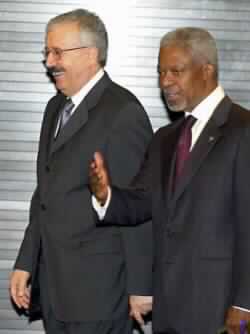UN officials and Iraqi diplomats reported progress in talks Thursday on whether to allow the return of weapons inspectors to Iraq, emerging from a closed-door meeting relaxed, smiling and hopeful. UN Secretary-General Kofi Annan sidestepped questions, however, on whether the world body and Baghdad were close to a deal that would permit the return of the inspectors for the first time in 3 1/2 years. (Read photo caption)
Pressed by reporters to make a prediction, Annan merely grinned and said "Inshallah," the Arabic word meaning, "God willing." The Iraqis, too, used the word to describe the prospects of success in the two-day session at the UN offices in Vienna.
"I'm satisfied with what has been done this morning," Annan told reporters.
The optimism came even though Iraq has a much broader agenda going into talks than the United Nations, whose key goal is the return of the inspectors.
The Iraqis want the United Nations to lift sanctions and address US threats to topple Saddam Hussein before agreeing to UN demands.
Under Security Council resolutions, sanctions can be lifted only when inspectors certify that Iraq's nuclear, chemical and biological weapons have been destroyed, along with the long-range missiles that deliver them.
The return of inspectors is a key demand of the council and especially of the United States, which has accused Iraq of trying to rebuild its banned weapons programs and of supporting terrorism.
US President George W. Bush has warned Saddam he faces unspecified consequences if he ignores demands that inspectors be permitted to check whether it has dismantled its weapons of mass destruction.
Underlining the cheerful mood of the gathering, UN spokesman Fred Eckhard said that Iraq and the United Nations were close to an agreement on returning Kuwait's national archives, which were looted during the 1991 Gulf War.
Describing the deal as "significant," Echkhard said, "it takes us in the direction of eventual normalization."
The two-day meeting is the third since early March between Annan and Iraqi Foreign Minister Naji Sabri. At the last session in May, Annan reported progress. He said he hoped Iraq would have "some positive news" at the next round.
The hopeful assessments came just a day after cautious diplomats deflected nearly every effort to characterize the talks or suggest whether a breakthrough was even possible.
Part of the problem is that Annan alone doesn't have the ability to resolve the key issues Iraq wants addressed before allowing the return of inspectors, who left ahead of 1998 allied airstrikes punishing Baghdad for blocking inspections.
Iraq wants answers to 19 political questions that Sabri delivered to Annan at their first meeting especially on lifting sanctions, US threats against Iraq, "no-fly" zones in northern and southern Iraq enforced by US and British aircraft and the creation of a nuclear weapons-free zone in the Middle East.
Sabri on Thursday suggested that the Iraqis hadn't budged and said the Iraqis had even added to their list of questions.
PHOTO CAPTION
U.N. Secretary General Kofi Annan (R) walks with Iraqi Foreign Minister Naji Sabri prior to a meeting in Vienna July 4, 2002. The United Nations and Iraq began talks on the return of weapons inspectors to Iraq, a prerequisite for lifting sanctions against Baghdad. (Leonhard Foeger/Reuters)
- Author:
& News Agencies - Section:
WORLD HEADLINES


 Home
Home Discover Islam
Discover Islam Quran Recitations
Quran Recitations Lectures
Lectures
 Fatwa
Fatwa Articles
Articles Fiqh
Fiqh E-Books
E-Books Boys & Girls
Boys & Girls  Hajj Rulings
Hajj Rulings Hajj Fatwas
Hajj Fatwas














